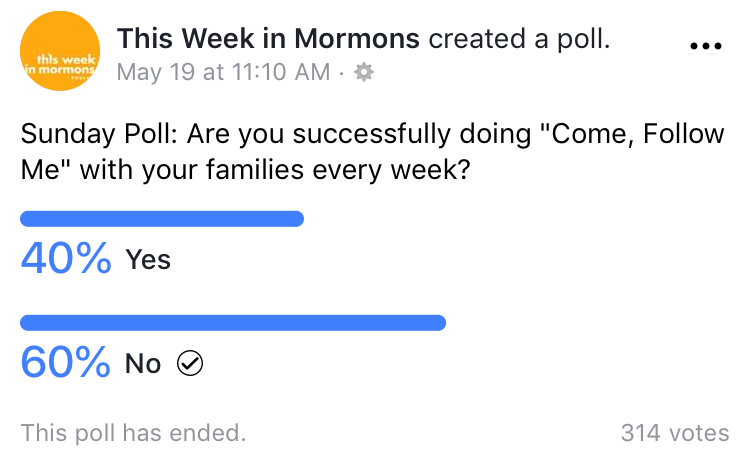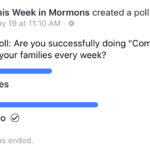A few weeks ago I saw a poll that got me thinking. This Week in Mormons asked who was feeling successful with Come Follow Me. Here are the results:

At the time of this poll, I was reading the CFM material on my own, but our family had given up trying to study together. The most recent attempt (since we don’t have time to do it before Church because Mom is always working on the program, let’s do it in the car!) had ended in disaster. Jared told me I was un-Christlike and unworthy to discuss the material because I was not nice enough when I told him (twice) he was mumbling and Sydney couldn’t hear him in the backseat. It ended with us all mad and sitting in silence for the 25-minute drive to church. And we just gave up.
Satan = 1, Jesus = 0
So I suppose it I goes without saying that I was part of the TWIM poll’s 60% who are not successfully doing CFM with my family each week.
Actually it was kind of a relief to be in the majority. It freed me to do some analysis instead of self-recrimination.
So I did. I started thinking. Why do I hate CFM so much? I feel the spirit when I read, but the manual isn’t particularly useful for our family or me personally, and I’m feeling hollow. I don’t feel successful even though I’m reading. What would it take to be successful at CFM? Reading daily? Doing one of those worksheets everyday? Becoming a better gospel scholar? Listening to some of those podcasts people are recommending? Listening to the reading with my kid in the car? A color-in-the-assignment reading chart?
Well, reading chart can drop off my list immediately. Though I’m a list-keeper, I am not particularly motivated by charts — I focus too much on the blanks. Plus, I’ve never been a daily reader of the scriptures, and I don’t think CFM is going to change that for me.
What’s more, the program does not seem to have been designed with daily reading as a goal. Like the Seminary program, CFM is (unfortunately) STILL designed around teacher convenience — units of reading — as opposed to roughly equal sections of reading that would make regular or daily study possible. This frustrates me. If daily reading is our goal — like in Seminary, if daily reading is the habit we want kids to develop and it’s the requirement for graduation — for “success” — then why do we have assignments that vary from 5-40 pages a week? It’s because the Seminary program isn’t prioritizing kids, it’s prioritizing teacher presentation. CFM has the same problem. The uneven length of readings makes regular study impossible, even for those with a lot of study experience, like me. I can only read the same chapter about 3 times before I’m out of ideas and have studied all I care to. (I really think if we’d fix reading charts to be more evenly distributed, we’d see a huge change in participation rates for both Seminary and CFM.)
So how about listening to audio scriptures or a podcast? That’d be nope. I don’t do well with audio scriptures — my mother played the scriptures on tape for us to fall asleep at night — and I’m not a huge podcast fan. I’m a fast reader and would always prefer to read a transcript so I don’t waste so much time on the fluff in podcasts.
I don’t know about you, but the CFM podcast phenom makes me uncomfortable for some reason. I also cringe at the worksheet-makers (sellers). But I do have to admit, I’ve not listened to even one podcast on CFM or downloaded one worksheet. Avoiding them feels like a matter of principle, but it may just be pride.
Anyway, be it pride or principle, I’m just not willing to outsource my gospel study to others in the form of podcasts or worksheets. I’m comfortable in my ability to read the scriptures and study topics in depth on my own, and I do. I want to be able to form my own opinions. I want to hear your opinions, yes, but I prefer to hear them in the context of a dialogue, because I think in dialogue we can refine an idea and come closer to truth.
In my area, there are limited options for this kind of dialogue, and the last time I got close enough to a person to feel comfortable really sharing my bigger questions and crazier theories, it went sideways. I’m still not sure if it’s because I showed too much of what’s inside me, and so we got too close, or what. Doesn’t matter, I guess. For me, a study buddy isn’t really an option.
When we were in college, I used to love talking gospel with Jared, but now, frankly, he can’t keep up with me. He has hardly read the scriptures since his mission, nor does he really have the time (or inclination) to study or think deeply, making connections. I can do the light lifting on my own. I need a smarter-than-me friend or a crazier-than-me friend or at least a not-a-pushover friend to keep me straight for the heavier thoughts. Jared has good thoughts, but he is just is not a thinker about the scriptures in the way I wish, he can’t treat or examine a notion on the fly during a discussion (nor does he have the doctrinal chops to do so), and he’s too easily persuaded by my thoughts to be really helpful.
I miss my friend’s brain. :(
So with all of this, the boring manual, and the lack of direction which means there’s no way to feel “successful”, I’ve been left feeling very hollow with CFM. I didn’t know why I was reading or why I felt I was trying to kick against the pricks or even how to implement this teaching I’m supposed to be doing in my one older kid home with such garbage manual topics completely devoid of context.
The Realization
I don’t know when it finally occurred to me that I was looking at this whole thing wrong. CFM isn’t about reading. It isn’t about learning more about ancient Judaism. It isn’t about learning the scriptures better. The answer was right there on the front cover all along. It’s about accepting and acting on the invitation to “Come, follow Me”. Success in CFM is not about podcasts or worksheets or thi in general great thoughts. It’s about becoming like Jesus. Walking in His Ways. At the end of this year, I will have been successful if I’ve become a little kinder, a little more obedient, meeker, peaceable, thoughtful, submissive, hopeful… more Christlike.
Somehow this realization has taken the frustration out of the study for me. Yes, I read. I want to know what the Savior taught and why. But ultimately, if those words don’t actually change me, my time was wasted.
So now that’s what I’m trying to do — focus on my own discipleship. My own following. If I can change even one bad thought or action or reaction to be in line with What Jesus Would Do, I will have been successful.
Come, follow Me.
It’s was right there all along.

